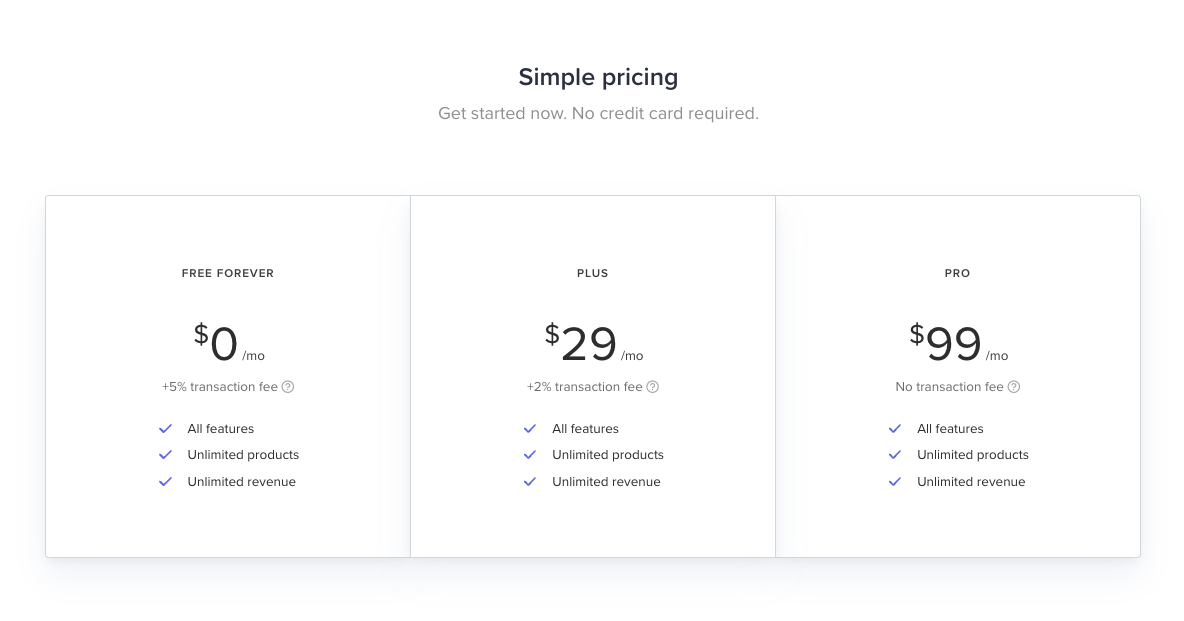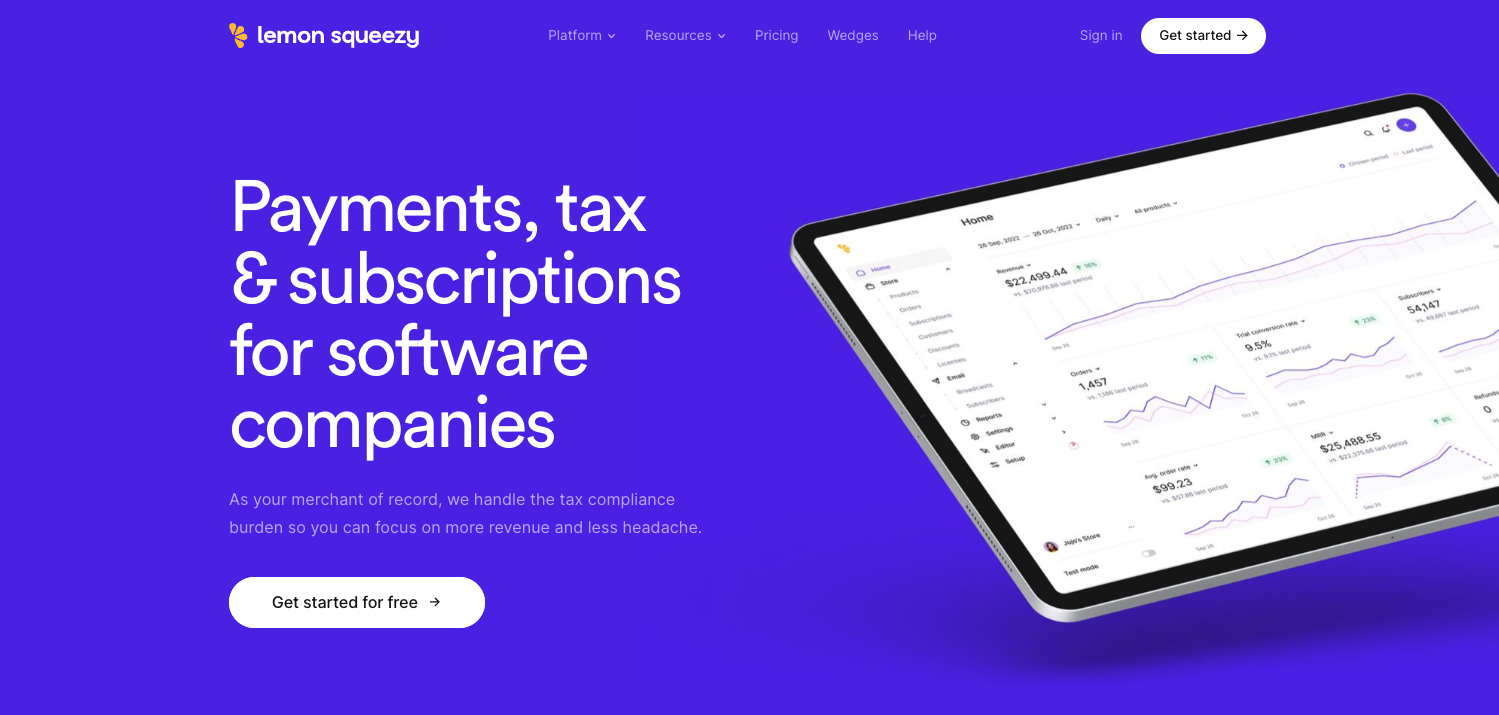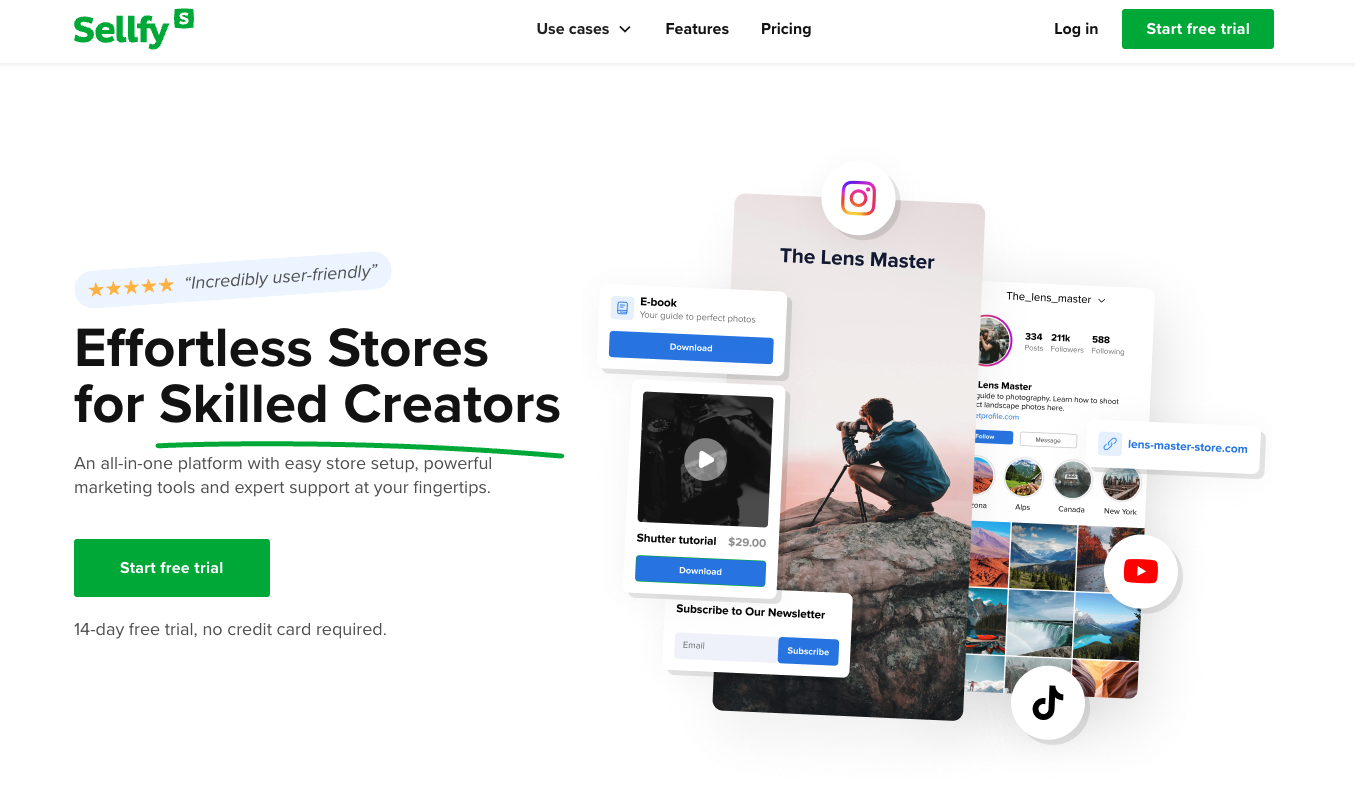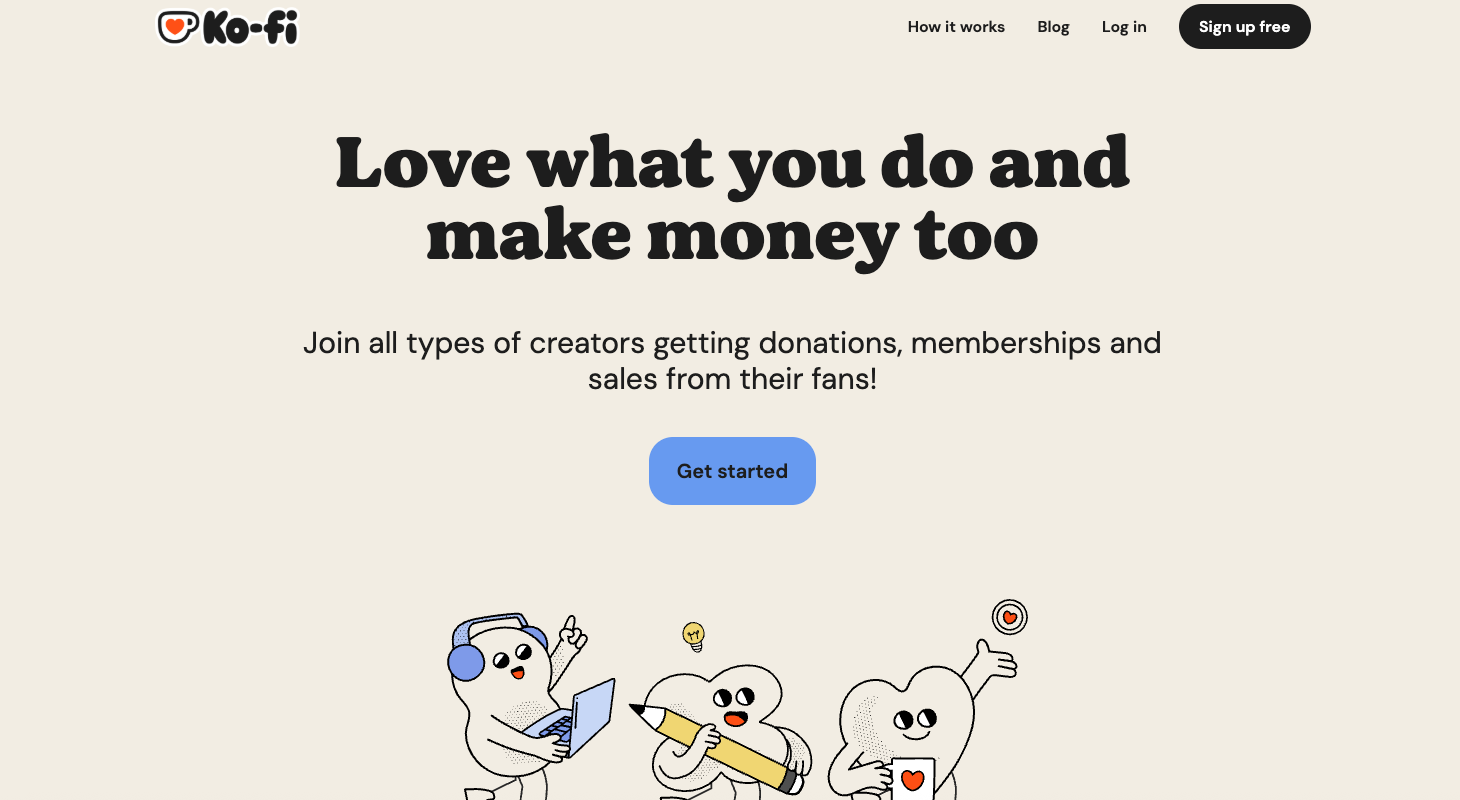12 Best Gumroad Alternatives (Cheaper + More Powerful) in 2026
Last updated: December 10, 2025
Gumroad is a popular platform for selling digital products. The platform provides a fully hosted storefront so you can sell digital products online in a matter of minutes. Gumroad also comes with other features such as features to sell subscriptions, integration with Paypal and Stripe, and more.
That said, Gumroad has drawbacks that turn people off from staying on the platform. Online reviews have shown that amongst other things, Gumroad’s expensive pricing, lack of customer support, and lack of scalability for large volume sellers have led users to migrate to other platforms.
In this article, we’ll explore some of the best Gumroad alternatives for selling digital products so you can make an informed decision for your business. We have included many alternatives that are perfect for businesses that are just starting out, but we’ve also kept the scalability aspect in mind to ensure that you will never have to move to other platforms as your business grows.
Feel free to skip ahead to the TLDR section – I just want to know what is the BEST alternative to Gumroad.
What Is Gumroad and What Does It Offer?

Gumroad is an eCommerce platform designed for creators selling digital products. It provides a range of features, such as the ability to sell various product types including digital downloads and subscriptions. It also offers analytics and marketing tools, as well as the ability to embed product pages on your website.
With Gumroad, you’ll have a fully-hosted online store where you can sell your products from. Gumroad also has an online marketplace called “Gumroad Discover” where your products can appear alongside other creators’ listings, helping drive organic exposure.
How Much Does Gumroad Charge?
As of 2026, Gumroad charges a 10% platform fee plus a flat $0.50 per sale. If a sale comes through Gumroad Discover, you will be charged at 30% per sale. In addition, you’ll also pay standard payment processor fees, which is typically around 2.9% + $0.30 per transaction via PayPal or Stripe. Lastly, if you want your money to arrive faster, instant payouts at Gumroad will cost an extra 3% fee (up to $10,000).
How much does Gumroad take per sale? Let’s break it down mathematically. Suppose you sell a digital product for $100 through your Gumroad storefront (not via Gumroad Discover).
Here’s the breakdown:
- Gumroad fee (10% + $0.50): -$10.50
- Payment processor fee (2.9% + $0.30): -$3.20
- Total fees: -$13.70
Your final payout is approximately $86.30
If you choose instant payout, you’ll lose an extra 3% ($3), leaving you with a final take-home payout of approximately $83.30.
If the sale came through Gumroad Discover, the fee jumps to 30% ($30), so after processing fees, you’d receive closer to $66.50, or $63.50 if you choose instant payout.
Why Are People Leaving Gumroad and Looking for A Gumroad Alternative?
1. Expensive Fees and Lack of Scalability
Gumroad’s flat rate of a 10% +$0.50 fee for every sale is incredibly expensive for businesses who are just starting out, but it’s even more expensive as your business grows because your expenses will continue to increase as a percentage of your revenue. Imagine earning US$100,000 per month and having to pay $10,000 fees, that doesn’t sound exciting at all.
And that’s just the start. If your sale comes through Gumroad’s marketplace, you’ll pay a hefty 30% fee instead of the usual 10% plus $0.50. On top of that, there’s an extra 3% fee for instant payouts, along with additional payment processor fees from PayPal or Stripe. These hidden costs pile up fast and eat into your profit margin before you even see it.
For some context, back in the day, Gumroad used to charge reduced fees as your store revenue increased, which made it easier for creators to grow. But in 2022, they removed that pricing structure and replaced it with a flat 10% rate. By the end of 2024, they raised prices again to the current pricing model, which unfortunately leaves creators with ballooning operational costs as their store grows.
Thankfully, there are many other platforms that offer equally (if not more) powerful features for selling online. For example, digital product eCommerce platforms like Payhip only charge a 5% fee for every sale, with optional fixed monthly plans that go up to a maximum of $99 per month. So yes, you won’t be paying more than $99 per month, even if your store earns $1 million+ in revenue.
2. Unreliable Customer Support
Many creators have expressed frustration over Gumroad’s delayed support responses, which can be especially concerning when it comes to payout issues. Waiting days for a reply when your income is on the line is far from ideal. In a business where cash flow matters, creators often gravitate toward platforms with faster, more dependable customer support.
3. Lack of Customizability
While Gumroad provides a fully-hosted storefront to sell your products on, you won’t be able to customize the appearance of your online store to match your branding. Gumroad has a distinctive store theme that applies to all of its sellers’ storefronts. The only thing you can customize on your storefront is a single highlight color and a few small customizations such as your name, bio, and logo.
In comparison, other alternative platforms presented in this article have advanced store builder capabilities that are beginner friendly (no coding or design skills needed), but are still able to give you the full freedom to create a highly converting online store that matches your branding.
4. Need to Sell Physical Products or Diversify Income
Gumroad is designed primarily for digital products, and it does not support selling physical products. That limitation can become a major roadblock for creators looking to expand their offerings or build a more diversified income stream. On the other hand, platforms like Payhip lets you sell digital and physical products from the same store.
5. Find Better Alternatives for Selling Online Courses
If you’re selling products such as digital downloads, Gumroad is generally quite good at instantly delivering your files to your customers. However, if you’re still online courses, the platform does not provide robust functionalities that other online course platforms typically offer.
Gumroad’s online course feature allows you to upload a video or other files that your students can download or click to watch the video. But this isn’t the engaging learning experience that you’d expect to see from an online course platform. There are no advanced course features such as assessments, drip schedule, or certificates of completion.
Here’s an example of a student’s course experience:
In comparison, here’s what an engaging learning experience with various lesson formats would look like (the example below is from Payhip):
12 Best Gumroad Alternatives for Selling Digital Products
Now let’s take a look at some of the top alternatives to Gumroad for selling digital products. Each platform offers unique features and pricing plans, so it’s important to compare them carefully before making your decision.
1. Payhip
Payhip is the best Gumroad alternative overall in terms of value and affordability.
Payhip is by far the most popular platform that often gets compared to Gumroad as they are the closest Gumroad competitor that offers all the features that Gumroad has to offer with way more affordable pricing that is perfect for businesses of all sizes.
One of the most commonly compared features is Gumroad Discover, which is Gumroad’s marketplace for digital products. Payhip offers a similar feature through the Payhip Marketplace. The key difference is that Payhip does not charge any additional fees to have your listings displayed in the marketplace, so you enjoy the added exposure without paying extra.
Established in 2011, Payhip started as an eCommerce platform to provide solutions for creators to sell digital downloads. Fast forward to today with over 150,000 sellers on the platform, Payhip is the industry-leading platform for creators to sell just about any type of product including digital downloads, online courses, coaching services, memberships and subscriptions, and also physical products.
Payhip is popular for having a Forever-free pricing plan that gives sellers access to ALL of the features that the platform has to offer. Instead of the hefty 10% + $0.50 that Gumroad charges, Payhip only charges 5% for every sale. Once your revenue grows, you can switch to Payhip’s monthly subscription to keep your costs low. You will never have to worry about scaling your business at Payhip.
Sellers on Payhip often rave about the platform’s customer support, praising the team for being genuinely caring, responsive, and always ready to help no matter how small the question. It is a level of service that truly stands out in the eCommerce space. Just take a look at Payhip’s reviews or reach out to Payhip’s support team at contact@payhip.com so you can experience it yourself.
If you’re looking for a platform that is genuinely invested in the success of your business, Payhip is your best option.

PRICING:
Payhip disrupted the industry by providing an unconventional pricing plan that is geared towards helping small businesses succeed, but also ensuring that businesses will keep their costs low as they grow to become million-dollar businesses.
Payhip offers a choice between 3 pricing plans:
- Forever-free with 5% fees (perfect for beginners)
- $29/month with 2% fees
- $99/month with no fees
So why is this “unconventional”? That’s because all of Payhip pricing plans offer the same access to ALL of their amazing features. Payhip’s founders created the company with a strong belief in creating a platform that helps small businesses grow by never limiting their access to the powerful features that they need. This sentiment is greatly appreciated by many sellers on Payhip’s online reviews.
If you’re just starting out, you can start on Payhip’s most popular Free-forever plan with no monthly fees + 5% fees per sale. Once your business grows, you can switch to Payhip’s Plus plan at $29 per month fees + 2% fees per sale or the Pro plan at $99 per month fees (no other fees per sale).
Payhip has maintained this pricing for years, and you can have a peace of mind that this pricing isn’t going anywhere.
PROS ?:
- The most affordable alternative to Gumroad
- The Payhip Marketplace helps you reach a wider audience and increase sales without any additional cost
- Built-in key features to sell various products including:
- Digital downloads
- Online courses: engaging course player, various lesson types, drip schedule, various pricing options, certificates
- Coaching: centralized platform to manage and communicate with your clients
- Subscription or membership: charge recurring fees and distribute exclusive content to members
- Physical products: manage inventory and fulfill orders
- Unlimited product listings and unlimited revenue
- Stunning full customization of your storefront (no coding needed)
- Instant and secure payouts via Paypal and Stripe
- Pay-what-you-want pricing option for your products (a.k.a. Tip Jar)
- Collaborations tool to launch digital products with up to 4 different creators
- Collects and remits UK & EU VAT on your behalf
- Advanced marketing tools such as affiliate program, referral system, upselling, cross-selling, coupon codes, and more
- Bonus: Payhip is also highly praised for its customer support quality. Every user is treated with priority regardless of the pricing plans that you’re on
CONS ?:
- No automated shipping label integration or software (e.g. Shippo or ShipStation). Payhip’s platform is more geared toward digital products, but you’re still able to comfortably sell physical products if you want to
For a more detailed comparison, check out the Payhip vs Gumroad comparison chart to see the features of both platforms side by side.
2. Shopify
As one of the largest eCommerce platforms in the world, Shopify is often a popular option as a Gumroad alternative. Shopify is a comprehensive e-commerce platform that allows you to create an online store and manage your products. It also offers a wide range of software and features, such as payment processing, analytics, and marketing tools. Additionally, Shopify has a variety of pricing plans to suit different budgets.
Given the size of this eCommerce platform, there are thousands of third-party apps spanning across all business categories that you can connect to your Shopify store. This allows you to equip your online store with unique software from tweaking the design of your website to marketing tools, and more. The only caveat is that these apps are often not free, so you’ll have to manage your expenses carefully.
While Shopify is a powerful eCommerce platform, it does not come with built-in features to sell digital products because Shopify’s platform is geared towards tangible items. You will have to install additional third-party apps that would potentially add to the cost of selling your digital products.
PRICING:
For small businesses that want to explore various platforms before settling on one that suits their needs, Shopify offers a 14-day free trial. There is no forever free plan.
At $39/month, Shopify’s Basic Plan is the most popular plan. Additional Shopify plans are available for $105/month, $399/month for Advanced Shopify, and $2000/month for Shopify Plus/Enterprise. There is an additional transaction fee that you’ll need to pay per sale.
As mentioned above, Shopify’s platform does not come with built-in features to sell digital products. You’ll most likely need to install third party apps from the Shopify app store which will usually come at extra costs.
PROS ?:
- Access to thousands of third party apps on the Shopify app store
- Supports multi-channel sales. This is especially helpful if you have a brick-and-mortar store
- Shopify is used by many small businesses, as well as by content creators who specialize in Shopify content. These communities will probably be able to give you a lot of helpful tips on online businesses
- While Shopify’s features aren’t sufficient for sellers whose catalog is predominantly digital products, physical product sellers could benefit from Shopify’s robust eCommerce features
CONS ?:
- No built-in features to sell digital products. You’ll need to install third party apps which will most likely come with extra costs. Shopify is not a suitable option for creators
- No built-in complex marketing tools such as affiliate marketing, referral, upsell, cross-sell, and more
Read our Gumroad vs Shopify article for a more in-depth comparison.
3. Kajabi
Kajabi is another popular alternative to Gumroad as it also provides an all-in-one platform to sell digital products. The main advantage of Kajabi over Gumroad is that it also allows creators to set up a community. However, Kajabi is also known for having monthly fees that are not quite friendly for small businesses that are just starting out.
PRICING:
Kajabi offers a 14-day trial. You will need to input your payment information before you’re able to start your free trial.
Once your free trial ends, you have an option between 3 paid plans:
- Kickstarter: $89/month
- Basic: $149/month
- Growth: $199/month
- Pro: $399/month
There’s a small amount of discount if you choose to purchase the annual subscription.
PROS ?:
- Kajabi provides educational resources for their users through Kajabi university (although it’s worth noting that you’re probably going to be able to obtain these information from free Youtube videos online)
- Access to features that aren’t available on Gumroad such as community, sales funnels, and more
CONS ?:
- Not affordable for small business customers
- Complex marketing feature such as affiliate program is only available on the Growth and Pro plans
- Numerous limits on various things such as the number of products, number of contacts, number of members, number of admin users, and more. Not recommended for those of you who would like to “set-it-and-forget-it” because you’ll need to keep track of your usage
4. Podia
Podia is also one of the most popular alternatives for creators. One of the main advantages of using Podia is the fact that they offer an integrated email marketing feature, but bear in mind that there are additional costs that come with that feature.
PRICING:
Podia offers a 30-day trial. Once your free trial ends, you have an option between 2 paid plans:
- Mover: $39/month + 5% transaction fees per sale
- Shaker: $89/month
In addition, you will also need to pay Stripe and Paypal transaction fees for either pricing plans.
PROS ?:
- Features to sell other product types that aren’t available on Gumroad such as community and webinars
- On-page chat widget to help you interact with your website visitors
CONS ?:
- Complex marketing tools such as affiliate marketing is only available on the Shaker ($89/month) plan
- Podia’s email marketing feature has separate additional monthly costs depending on the number of subscribers that you have. Unfortunately the email marketing feature is not comparable to dedicated email marketing platforms like MailChimp, ConvertKit, or Email Octopus.
5. Mighty Networks
If you’re looking for a Gumroad alternative to establish a community, sell online courses, or sell coaching services, Mighty Networks is a popular option. While this platform might not be suitable for selling digital downloads, you might find this a better Gumroad alternative for selling courses.
PRICING:
Might Networks offers a 14-day trial.
Once your free trial ends, you have an option between 4 paid plans:
- The Community plan: $49/month + 3% transaction fees
- The Courses plan: $119/month + 2% transaction fees
- The Business plan: $219/month + 2% transaction fees
- The Path to Pro plan: $430/month + 1% transaction fees
In addition, you will also need to pay Stripe transaction fees on any of the pricing plans.
PROS ?:
- Mighty Networks’ features for community-building is more developed than other platforms listed in this article, the interface almost mimics that of a social media platform
- Members can see each other’s posts through content feed which may encourage more genuine interactions
CONS ?:
- The fees are quite expensive especially given the fact that you’ll be paying monthly fees AND also transaction fees
- Lack of robust features for selling product types such as digital downloads
- Online course features are only available on the Courses plan and above (a minimum of $119/month)
- Does not have integration with PayPal
6. Etsy

Etsy attracts creative entrepreneurs who want to sell their work to a large and ready audience. Artists, designers, and crafters use the platform to list handmade products, vintage finds, and digital downloads without the need to build a full ecommerce website. While Etsy does not offer much flexibility in customization, it gives sellers immediate exposure to millions of buyers actively searching for unique and creative goods. Sellers pay listing and transaction fees, but the platform’s simplicity and built-in traffic help creators start selling fast with minimal setup.
PRICING:
Etsy takes a 6.5% transaction fee on the total order amount. In addition, Etsy charges a flat $0.20 listing fee when you create a product.
Etsy product listings expire after 4 months, so you will pay another $0.20 listing fee every time you renew your product listings.
PROS ?:
- Huge customer base with built-in marketplace visibility
- Great for arts, crafts, and digital templates
- Easy setup with no monthly fees
CONS ?:
- Limited branding and customization for your storefront
- Highly competitive with many similar listings
- Selling on Etsy means that you’re sending traffic to a website that isn’t owned by you. As the seller, you are at the mercy of Etsy’s unpredictable algorithm, and risk store suspensions or unfair negative customer reviews with little control or recourse.
- If you sell digital products, Etsy might not be the most suitable marketplace since it has traditionally focused more on handmade crafts and physical goods.
7. SendOwl

SendOwl offers a streamlined way for creators to sell digital products and subscriptions directly through their own websites or blogs. Ideal for authors, musicians, and educators, this platform focuses on simplicity, speed, and flexibility without requiring a full online store.
While it does not offer a storefront builder, SendOwl compensates with features like cart abandonment recovery, affiliate tools, pay-what-you-want pricing, and customizable emails and checkouts to enhance your customer experience. For creators who value control, low maintenance, and a clean checkout process, SendOwl is a practical alternative to Gumroad.
PRICING:
SendOwl offers a 7-day trial.
Once your free trial ends, you have an option between 3 paid plans:
- Starter plan: $39/month
- Standard plan: $87/month
- Pro plan: $159/month
In addition, you will also need to pay Stripe transaction fees on any of the pricing plans.
PROS ?:
- Integrates seamlessly with Shopify
- Simple and quick to set up
- SendOwl’s Standard and Pro plans include useful marketing features such as cart abandonment recovery, upsell options, and affiliate program support
CONS ?:
- SendOwl’s pricing plans come with limitations on order volume, revenue, storage, product count, and file size, which can be difficult to manage as your store grows. In contrast, platforms like Payhip offer unlimited access to these features, making scaling much easier
- Marketing tools are not available on the Starter plan and only unlock on the Standard plan or higher (starting at $87 /month). This can be a barrier for new sellers who often benefit most from built-in growth tools
- Support access also varies by plan, with priority and VIP support reserved for Standard and Pro users, which may affect the level of assistance available to those on entry-level plans
- SendOwl does not act as a merchant of record, meaning you are responsible for handling VAT and sales taxes yourself
8. Lemon Squeezy

Lemon Squeezy is a digital commerce solution built for creators selling software, apps, and other downloadable products. It is especially useful for global sellers who need tools for subscription management, licensing, and built-in tax compliance. Acting as a Merchant of Record, Lemon Squeezy takes care of international taxes and financial reporting on your behalf.
PRICING:
Lemon Squeezy charges a flat fee of 5% + $0.50 on every transaction. In addition, Lemon Squeezy also applies extra fees such as payout charges and marketing fees for sales generated through specific features like abandoned cart recovery and affiliate referrals.
PROS ?:
- Handles taxes as a Merchant of Record
- No monthly fees
- Customizable store builder
CONS ?:
- Lemon Squeezy’s pricing model does not include an upper cap, so as your revenue grows, your fees scale with it. This means sellers might encounter similar pricing issues on platforms like Gumroad
- Lemon Squeezy charges extra fees for certain payout methods and marketing features, which can reduce your overall earnings
- It is worth noting that Lemon Squeezy has been acquired by Stripe, so sellers will now have to go through an approval process during sign up. This makes it harder for smaller less established sellers to use the platform as there is no confirmation on the approval process duration length
- Being acquired by Stripe also means that Lemon Squeezy is unlikely to support alternative payment gateways, which can limit options for buyers in countries where Stripe is not available. This may restrict your ability to reach a truly global audience
9. Sellfy

PRICING:
Sellfy offers a 14-day trial.
Once your free trial ends, you have an option between 3 paid plans:
- Starter plan: $29/month
- Business plan: $79/month
- Premium plan: $159/month
In addition, you will also need to pay Stripe transaction fees on any of the pricing plans.
PROS ?:
- Offers built-in print on demand services with automatic fulfillment, perfect for artists and designers
- Instant payouts help creators access their earnings without delay
- Comes with a 30 day money back guarantee, giving new users peace of mind when trying out the platform
CONS ?:
- Revenue is capped based on your subscription plan, and exceeding the limit may require an upgrade or trigger a 2 percent overage fee
- Product file size limits vary depending on your selected plan, which may restrict larger digital downloads
- Advanced marketing tools like cart abandonment recovery and affiliate marketing are only available on the $79 per month plan and above
- Sellfy does not act as a merchant of record, meaning you are responsible for handling VAT and sales taxes yourself
10. Patreon 
Patreon is a membership-based platform that allows creators to earn recurring income by offering exclusive content, community access, and perks to their supporters. Unlike Gumroad, which focuses on one-time purchases, Patreon centers around ongoing subscriptions, making it ideal for creators who produce content regularly, such as podcasters, artists, and educators. With built-in community tools and flexible tier options, Patreon lets you build strong relationships with your audience while generating steady monthly revenue.
PRICING:
Patreon takes a percentage of your earnings based on your plan:
- Founders: 5%
- Pro: 8%
- Premium: 12%
The platform fee on Commerce digital sales is 5% of successfully processed sales
PROS ?:
- Built-in support for memberships and recurring income
- Strong community features to engage and reward loyal fans
- Easy to set up with flexible tiered offerings
- Great for creators who produce content regularly and want steady income
CONS ?:
- Not ideal for one-time product sales like digital downloads or courses
- Platform fees and processing charges can add up, especially on higher-tier plans
- Limited control over storefront branding and customer experience
- Heavy Patreon branding and reliance on their ecosystem to reach your audience
11. Ko-Fi

Ko-fi is a lightweight platform designed for creators who want to accept donations or tips, but creators can also sell digital products, or offer memberships with minimal setup. It is a simple and flexible alternative to Gumroad, especially for those just starting out or looking to monetize without complex storefronts.
PRICING:
Ko-Fi charges a 5% fee per transaction. In addition, you will also need to pay Stripe transaction fees on any of the pricing plans.
PROS ?:
- Great for creators looking to receive donations or use a virtual tip jar
- Simple and user friendly with no upfront costs
- Easy to set up and start earning quickly
- Instant payouts give creators fast access to their funds
CONS ?:
- Pricing model has no upper cap, so fees grow with your revenue similar to Gumroad
- Limited ecommerce features make it harder to scale a full online business
- Advanced tools like memberships, custom branding, and analytics require Ko-fi Gold
- Not ideal for large digital stores or creators needing advanced storefront capabilities
- No built-in marketplace to boost traffic or visibility
12. WooCommerce

WooCommerce is a powerful ecommerce plugin for WordPress that lets you build a fully customizable online store. While it is not specifically built for selling digital products, it does support them, allowing creators to sell ebooks, courses, templates, and other downloadable files.
WooCommerce is better known for its flexibility in handling both physical and digital products, making it a versatile choice for sellers who want complete control over their store’s design, features, and customer experience. However, it does require some technical knowledge to set up and maintain, which may not suit beginners looking for a simpler solution.
PRICING:
WooCommerce is a free, open-source plugin for WordPress that enables you to transform your website into a fully customizable online store. While the core plugin is free, running a WooCommerce store involves various costs:
- Hosting: Depending on your provider and plan, hosting can range from $3.49 to $50 per month
- Domain Name: Typically costs around $10 to $20 per year
- Themes: Free themes are available, but premium themes can cost between $20 and $100 per year
- Extensions and Plugins: To add functionalities like payment gateways, SEO tools, or advanced shipping options, you may need paid extensions, which can range from $0 to several hundred dollars annually
- Payment Processing Fees: Using WooCommerce Payments, for example, incurs a fee of 2.9% plus $0.30 per transaction for U.S.-issued cards
PROS ?:
- Free to use and fully open source
- Highly customizable with thousands of plugins and themes
- Supports both physical and digital products
- Full control over store design, features, and customer experience
- Seamlessly integrates with WordPress
CONS ?:
- Requires technical setup and ongoing maintenance
- Not specifically tailored for digital product sales
- Costs can add up with hosting, premium themes, and paid extensions
- No built-in customer support or marketplace traffic
- Beginners may find it overwhelming compared to simpler platforms like Payhip
TLDR – What is the best alternative to Gumroad for selling digital products?

Based on a full comparison of all the platforms above, Payhip stands out as the best alternative to Gumroad for digital product sellers:
- Most affordable: Only 5% fee per sale (with the option to switch to a flat monthly plan that caps your costs at $99/month). Get unlimited access to all features from day one, even on the forever free plan. No hidden upgrades or restrictions.
- Best feature parity: Matches and exceeds Gumroad’s core tools, including niche features like collaborations with automatic revenue splitting, license key generation, and support for selling digital downloads, online courses, coaching, memberships, and physical products.
- Handles taxes for you: Automatically collects and remits EU and UK VAT so you can have peace of mind selling globally.
- Most customizable: Build a beautiful, fully branded storefront using a simple drag and drop editor.
- Payhip Marketplace: Reach new customers and boost your sales without paying extra listing or discovery fees.
Final Thoughts – Finding The Best Gumroad Alternative For Your Business
There you have it! There are plenty of Gumroad alternatives that you can try out, so don’t forget to take advantage of each of the platform’s free trials to see which ones offer the perfect blend of benefits and pricing plans that suit your business needs.
At Payhip, we’re on a mission to make it easy for you to build and grow your online business without hefty fees. Sign up for a free account on Payhip to start your own online store in less than 5 minutes.
Frequently Asked Questions
Which platform is better than Gumroad?
Payhip is a better alternative to Gumroad for selling digital products because it offers lower fees and closely matches Gumroad’s core features with even more powerful features. Payhip allows full storefront customization, supports physical products, and also has Payhip Marketplace, which is an online marketplace similar to Gumroad Discover to help creators gain more sales and visibility without paying additional fees.
What are the top Gumroad competitors in 2026?
Some of the top Gumroad competitors in 2026 include Payhip, Shopify, WooCommerce, Ko fi, Patreon, and Kajabi. Payhip offers the most affordable pricing and the closest match to Gumroad’s core features. Payhip also has an online marketplace where creators can get extra visibility and sales opportunities without any added platform fees.
Is Payhip Better Than Gumroad?
Payhip is better for most creators because it is more affordable, easier to use, and offers full storefront customization. It includes powerful features like VAT handling and an online marketplace (no extra fees at Payhip). However, tech savvy users who want to build with open source tools may prefer Gumroad’s developer friendly environment.
Is Gumroad free to use?
Gumroad is free to start, but the platform charges a 10% + $0.50 fee per sale, or 30% if the sale comes from Gumroad Discover marketplace. Extra fees apply for instant payouts. In comparison, Payhip charges only a 5% fee on its free plan with no additional marketplace fees. Payhip is a more affordable and scalable alternative to Gumroad.
Is there a cheaper alternative to Gumroad?
Payhip is a cheaper alternative to Gumroad. While Gumroad charges 10% plus $0.50 per sale, Payhip only takes a 5% fee on its free plan and has no extra charges for marketplace sales or features, making it a far more affordable option for creators at any stage.
What’s like Gumroad but with lower fees?
Payhip is the closest platform to Gumroad in terms of features, but with lower fees. It charges just 5% per sale on the free plan and includes features like storefront customization, VAT handling, and a marketplace for digital products (without any additional listing or marketing fees).
Are there any free alternatives to Gumroad?
Payhip is a great free alternative to Gumroad. It offers a forever free plan with a 5% fee per sale, includes unlimited access to all features from day one, and does not charge extra fees for using its built-in marketplace. It is free, flexible, and scalable.








Comments
2 Comments
Thank you for this helpful comparison!
Hi Natalie. You are welcome. We are happy to hear it was helpful.
Leave a Comment